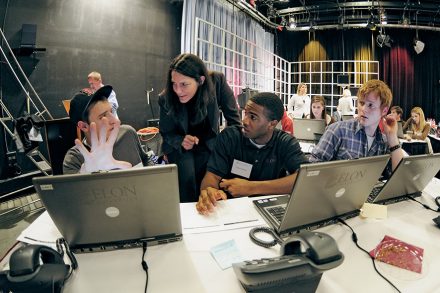President Connie Ledoux Book reflects on the university's continued recognition for excellence in undergraduate teaching.

There are headline moments in the life of an institution when the world takes notice. Wider audiences suddenly gain an understanding of the unique mission, values and excellence that have taken decades to build. For Elon, one of those moments came last September when U.S. News & World Report named our university No. 1 among national universities for excellence in undergraduate teaching. Elon’s faculty was ranked above the faculty at Princeton, Brown, Dartmouth, Notre Dame, Stanford, Duke and many other fine universities the public perceives as exemplars of excellence.
While Elon has been consistently ranked near the top by U.S. News since being categorized as a national university, being awarded the very top position was a culminating and well-deserved recognition of the high quality of an Elon education. Outstanding faculty compete to join the Elon community because teaching is their top priority. It is their passion and purpose, a life’s work, and they are very good at it. I’ve often described working as a faculty member at Elon as the sweet spot between teaching, scholarship and mentoring, a powerful combination that inspires students and faculty alike.
I am always proud to tell people that I began my service at Elon with 16 fulfilling years as a faculty member. That experience informs my leadership priorities and explains why I am passionate about higher education and about Elon University. Teaching is exhilarating and rewarding; it is also challenging and humbling. Faculty members at Elon are working to create a better world, and they start by helping students find their best paths to knowledge and begin lives of purpose. In this spring 2022 edition of The Magazine of Elon, you will see many familiar faces, faculty who are bringing learning to life, impacting the lives of our students and as a result changing the world.
Faculty members at Elon are working to create a better world, and they start by helping students find their best paths to knowledge and begin lives of purpose.
In 1993, Elon’s faculty adopted a four-credit-hour system, inspired by a vision that relationships in our classrooms would be more meaningful and more powerful if faculty had more time with students in smaller groups. It was called the “Engaged Hour.” That redesign of Elon’s curriculum continues to yield remarkable outcomes. In fact, when I visit with alumni, they are quick to share a story about a faculty member who changed their life. The backdrop for those relationships is often the classroom, but equally involves an experience abroad, advice during an advising session or mentoring over an undergraduate research project.
Some of my fondest memories at Elon are of colleagues sharing with me an excitement about something learned or a moment in their classrooms. When I was in my first year, Professor Ray Johnson inspired me with his passion about his course exploring the assassination of John F. Kennedy. A few years later it was Steve Braye’s use of problem-based learning techniques, and Sophie Adamson’s Global Experience class where she used soccer to drive learning about cultural, social and economic differences. One year, I observed Professor Matt Valles management class and spent time in Associate Professor Nim Bachelor’s philosophy class. Both are remarkable teachers, turning lectures into active group discussions that featured unsettling and unexpected questions, In these teaching moments, they created opportunities for students to not only discover new ideas but to become someone new on the other side of the learning.
Crafting this transformation through learning doesn’t come easily. That’s why there is a well-established field of study about the most effective practices in teaching and learning. Elon faculty are prominent leaders in this groundbreaking research. Deandra Little and faculty colleagues offer leadership in Elon’s Center for the Advancement of Teaching and Learning, which was established in 2005 to provide resources for faculty to deepen and enhance their expertise in the classroom and beyond. Faculty consult with and mentor one another and provide feedback through classroom observations. They also have access to grants, workshops and many programs to help them excel. You can read more about the work they do on page 36.
The national recognition of teaching excellence at Elon provides the perfect opportunity to highlight a few of many outstanding faculty members in this edition of The Magazine of Elon. I hope you’ll spend time reading about the work faculty are doing with students and the impact they are making in our community and around the world. Then please take a moment to send a note of thanks to your favorite professors. Elon faculty enjoy hearing from you and knowing that they were an important part of your life’s journey.
Connie Ledoux Book
President


